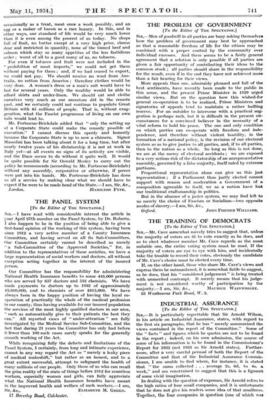THE PROBLEM OF GOVERNMENT
[To the Editor of THE SPECTATOR.] SIR, Men of goodwill in all parties are busy asking themselves how the problem of government may best be approached so that a reasonable freedom of life for the citizen may be combined with a proper control by the community over individual excesses. And there seems to be a fairly general agreement that a solution is only possible if all parties are given a fair opportunity of contributing their ideas to the common stock ; all parties should share in the responsibility for the result, even if in the end they have not achieved more than a fair hearing for their views.
More appeals than one, admirably phrased and full of the best sentiments, have recently been made to the public in this sense, and the present Prime Minister in 1929 urged similar views. But on the question how this wished-for general co-operation is to be realized, Prime Ministers and signatories of appeals tend to maintain a rather baffling reserve. For an outsider to intervene with a practical sug- gestion is perhaps rash, but it is difficult in the present cir- cumstances for a convinced believer in the necessity of a vital reform to hold his peace. The one and only condition on which parties can co-operate with freedom and hide- pendence, and therefore without violent hostility, in the formation of a national policy, is the revision of our electoral system so as to give justice to all parties, and, if to all parties, then to the nation as a whole. So long as this is not done, we are at the mercy of electoral accidents ; we are exposed to a very serious risk of the dictatorship of an unrepresentative assembly, governed by a false majority, itself ruled by extreme partisans.
Proportional representation alone can give us this just representation ; if a Parliament thus justly elected cannot support with reason and moderation a Government of a composition agreeable to itself, we as a nation have lost our traditional craftsmanship in politics.
But in the absence of a juster system, we may find left to us merely the choice of Fascism or Socialism—two opposite modes of slavery.—I am, Sir, &c.,
Oxford. JOHN FISCFIER WILLIAMS.








































 Previous page
Previous page